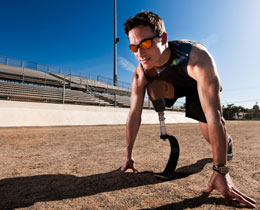Last week I was discussing with practitioners using the STEM Central Bioengineering context, and this free Super Legs Concept Cartoon provides a nice link between bioengineering and the Olympics.
Learners could consider the experience of athlete Oscar Pistorius, or that of Claire Lomas. Claire was paralysed in a horse riding accident in 2006, and was recently the first person to complete a marathon (in this case The London Marathon) in a “bionic” suit, taking 16 days to complete the 26.2 mile course. Find out more about how bioengineering and technology can change lives from BBC News Paralysed Woman Claire Lomas treasures 16-day London Marathon and “‘Bionic’ woman Claire Lomas completes London Marathon” and from the company which made the ”bionic” suit ReWalk Bionics Research.
The Bioengineering learning journeys are focused on third and fourth level, but the ideas and interactives could be translated for work across first and second level. Exploring prosthetic design could incorporate Glow Science videos such as The Movement of Joints, or perhaps the learners might be interested in finding out what we know about Ancient Olympians from the discovery of a 2000 year old skeleton?
















